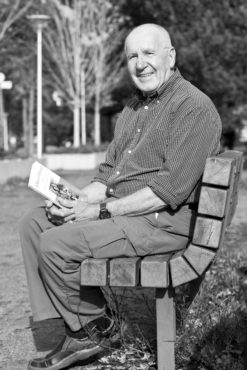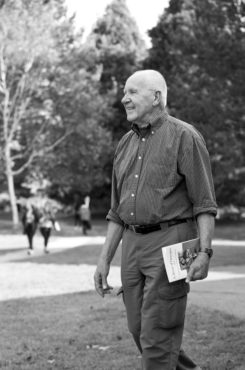The remarkable story of long-standing CFUV host Aldo Nazarko

All photos by Belle White, Photo Editor.
Over a period of 80 years, the city of Rijeka — formerly known as Fiume — changed nationalities five times. Prior to the end of World War I, the city belonged to the Austrio-Hungarian empire. From 1920-1924, it became an independent state, then fell into Italian hands until the end of World War II, although was occupied by Germany during this time as well. It was then annexed to Yugoslavia until its breakup in 1991, when Rijeka became a part of the Republic of Croatia — and so it remains.
The multicultural and war-torn history of this eastern European city may seem like light years away from the quiet, rainy enclave of Vancouver Island. But for Victoria-resident Aldo Nazarko, who was born in Fiume (the name he uses when referring to Rijeka), it appears that the memories of his childhood home have remained with him as long as he’s lived in Canada.
In his memoir A River of Oranges, Nazarko brings together the two different worlds, recounting his childhood as a refugee in occupied Italy and his eventual immigration with his family to Canada.
Those who frequent UVic’s Student Union Building may recognize Nazarko as a weekly staple: he’s hosted a radio show called ‘Off the Beaten Track’ with CFUV for 16 years now.
“I don’t know if [my time at CFUV] has inspired my book, but it certainly has in the interest that I have for music — the love that I have for music,” he says. “Some of the music that I mention in [my] book, I play on the show.”
Nazarko wrote A River of Oranges about 12 years ago. It was initially intended to be read only by his family, serving as a historical document for his grandchildren so they could know about their family heritage.
“1947 is what they called the year of the option: you could either remain Yugoslav under the communist government, [or] you could move to Italy in the Italian refugee camps.”
“I just distributed [the book] to my family … and then a friend of ours, who’s also a writer and an editor, wanted to read it, and so I gave it to her,” he says. “And she said, you know, this needs to be published.”
“It was an 80th birthday present [from her] to edit it and get it published.”
And Nazarko has lived an incredibly dynamic 80 years.
“We were all born in the same city — my mother, myself, and my two younger brothers,” he says. “My mother was born Austrian, my [one] brother [and I] were born Italian, and my youngest brother was born Yugoslav.”
The city of Fiume is an important part to the book. Both names — Fiume and Rijeka — are Italian and Croatian for the word river.
Nazarko sees Fiume as being a critical element to his book: “The city is one of the main characters,” he says.
The end of World War II saw the end of German occupation, and Fiume was this time captured by Yugoslavia. In 1947 it became a part of the Socialist Republic of Croatia under the Paris Treaty. A majority of Italians living in the city left to escape the communist regime, Nazarko and his family included.
“1947 is what they called the year of the option: you could either remain Yugoslav under the communist government, [or] you could move to Italy in the Italian refugee camps,” he says.
Nazarko recalls that approximately two-thirds of the city’s population left the city — 60 000 people. His family then travelled all through Italy, staying in refugee camps all over the country.
“We actually spent just over four years throughout Italy in different refugee camps — I think I counted ten altogether, between Italy and the final one in Germany,” he says.
“We lived in Port Arthur, Thunder Bay, when we first landed … It was in a way shocking, and in a way fantastic. It was all new.”
The migration movement Nazarko experienced during and following World War II was part of the greatest migration movement in history.
“Until today,” he qualifies.
With such a breadth of experience and life lived, Nazarko can look to the past and give a mediated perspective on today’s current events.
“[The migration of people today] makes me very worried — apprehensive. Because it’s almost worldwide, it’s not just limited [to one area],” he says.
Having experienced his fair share of authoritarian regimes and populist movements throughout his childhood, he is particularly disheartened with the rise of President Trump in the United States.
“I’d like to remain hopeful, but the evidence doesn’t help. I hope that there’ll be some enlightened leadership. But in a way it’s almost despair in what I see happening, especially in the States, because Trump is not the problem, the problem are the people who elected him, which is a very big number … So how do you change that?”
In Nazarko’s memory, the three main countries taking Italian refugees at the time were Canada, Australia, and, strangely, Venezuela. Times have changed.
At one of the refugee camps, there were employers from Canada.
“They were looking for workers. My father signed up to work in the bush in Northern Ontario, for a year as a logger,” says Nazarko.
Nazarko, his mother, and his siblings then stayed in a holding camp for nine months, until his father had made enough money to bring them over.
“We lived in Port Arthur, Thunder Bay, when we first landed,” he says. “It was actually in a way shocking, and in a way it was fantastic. It was all new.”
“I didn’t speak a word of English [when I arrived in Canada].”
“The book is about the very turbulent times of the period.”
“I started school in September, I was already 13, and I was placed in grade one … we had to line up with our class outside the school before we entered … and here are the little kids and here I am,” he laughs. “But by Christmas I was in grade five … [and] by the end of the year I graduated from grade eight.”
As for why the bookis called A River of Oranges? It’s not because Fiume means river — although that worked out well. There’s an entire chapter dedicated to a specific memory Nazarko has during his time at one of the refugee camps.
From the way he tells the story, it’s clear that the moment that inspired the name of his book is one of those moments we’ve all experienced: seemingly small and insignificant, yet perfect in its simplicity, and a moment that for some inexplicable reason we hold on to forever, maybe because of the specific time and place and smells and sounds that came with it. It’s a moment that we know can never be recreated.
“One of the camps was south of Naples, south of the city of Salerno, [in] Southern Italy,” he says. “There was more of a big large creek rather than a river, but it’s called a river. And it was only about a kilometre from the camp. And us kids used to go to the Saturday movie in the town that was a few kilometres away.”
“[As we cross] the bridge [over] this river that was flowing, we see … oranges floating, because there were orange orchards all along and around the bend, and it was on a slope, and so any oranges that would fall off the tree would just end up in the river.”
“We sort of thought, well, might as well go and get those oranges. So we used to go with sticks and things and get the oranges … [The oranges would be] constantly flowing, not in large clumps, but you know, one here, one there.”
The chapter describing this moment was featured in the Canadian literary magazine untethered in March 2018.
Nazarko summarizes his memoir well: “The book is about the very turbulent times of the period. It’s a background story on the city. And it’s actually more of a tribute to my parents and all the sacrifices and everything that they went through to see that we had a good life.”
Nazarko held his official book launch on Sept. 26 at Gorge-ous Coffee in Victoria. The event was a huge success, with over 120 people in attendance — some lining out on the sidewalk outside because there wasn’t room inside!
For Nazarko, life continues as it has for the last 38 years since he’s lived in Victoria. Every Wednesday, he passes by the Martlet office to record his radio show. But now, knowing what we do about this remarkable person’s history, we do a bit of a double take. If we hadn’t sat down and spoken with him, we’d never know.
Now, anyone can learn about the incredible story of Aldo Nazarko. A River of Oranges is available at both Munro’s Books and Bolen Books.
To get an idea of some of Nazarko’s other interests, you can tune into his CFUV radio show ‘Off the Beaten Track’ on Wednesdays from 1 p.m. to 2 p.m. at 101.9 FM in Victoria, B.C.
For any other information, visit www.ariveroforanges.ca







